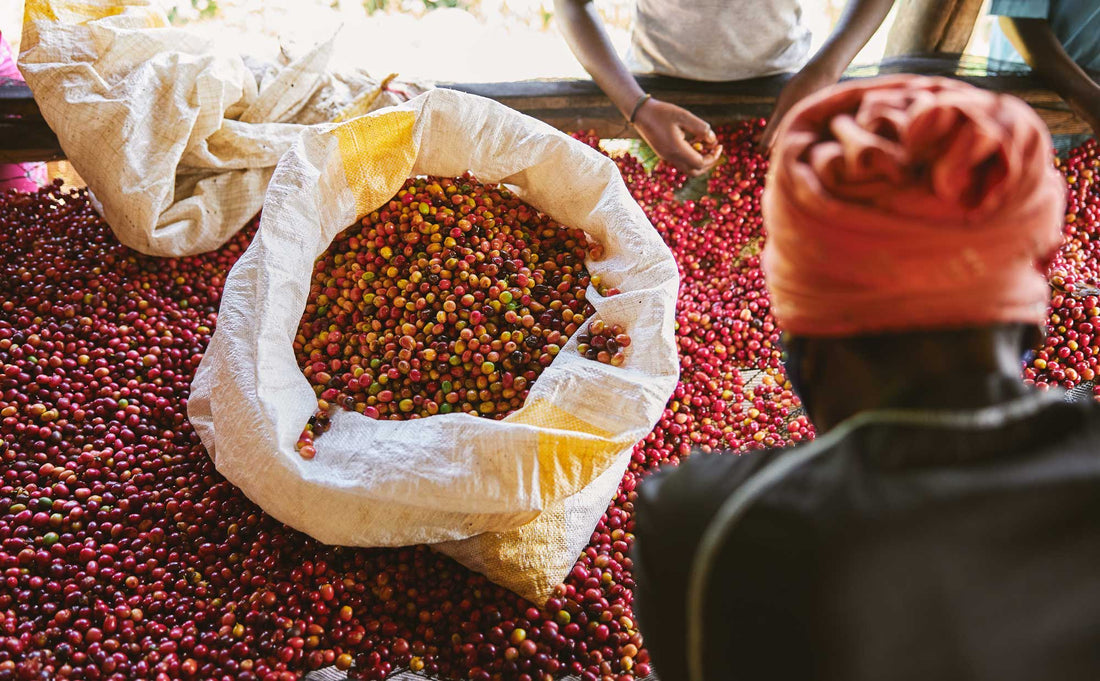The Origins of Coffee in Africa

Coffee has a long and fascinating history in Africa, with its origins tracing back to Ethiopia, where the coffee plant is native. The story of coffee's discovery in Ethiopia is steeped in legend and folklore, but historians generally agree that coffee was first consumed by the Oromo people, a group that has long inhabited the region.
The legend of Kaldi, the goat herder, is perhaps the most well-known story about the discovery of coffee. According to the legend, Kaldi noticed that his goats became unusually lively after eating the berries from a certain plant. Intrigued, Kaldi tried the berries himself and found that they had a stimulating effect. Kaldi shared the berries with others in his community, and the practice of consuming coffee soon spread throughout the region.
While the story of Kaldi is perhaps the most famous, it is just one of many legends surrounding the origins of coffee in Ethiopia. In fact, it is likely that the practice of consuming coffee dates back much further than the time of Kaldi. Some historians believe that coffee was used by ancient Ethiopians for its medicinal properties, while others suggest that it was used in religious ceremonies.
Regardless of its exact origins, coffee quickly became an integral part of Ethiopian culture. Coffee ceremonies, in which coffee is roasted, ground, and brewed in front of guests, are still a common practice in Ethiopia today. Ethiopian coffee is also known for its unique preparation methods, such as the use of a traditional clay pot called a jebena to brew the coffee.
Coffee cultivation soon spread from Ethiopia to other parts of Africa, including Yemen and Sudan. The Arabica coffee plant, which is widely cultivated in Africa today, is believed to have been brought to Yemen from Ethiopia in the 15th century. From there, it spread to other parts of the Arab world, and eventually to Europe.
The Rise of African Coffee Production

In the 19th century, European colonial powers began to establish coffee plantations in various African countries. This led to an increase in African coffee production, which in turn contributed to the growth of the global coffee industry.
Coffee production in Africa has faced many challenges over the years, including economic pressures, political instability, and climate change. Despite these challenges, coffee continues to be an important part of the African economy, providing livelihoods for millions of people and contributing to the global coffee industry.
Coffee Production in Africa Today

Africa has a long and storied history of coffee production, and today the continent is home to some of the world's most exceptional coffee beans. Coffee production in Africa has faced many challenges over the years, including economic pressures, political instability, and climate change. Despite these challenges, coffee continues to be an important part of the African economy, providing livelihoods for millions of people and contributing to the global coffee industry.
Today, African coffee production is concentrated in a few key countries, including Ethiopia, Kenya, Tanzania, Rwanda, and Uganda. Each of these countries produces coffee with its own unique flavor profile, due to variations in soil, climate, and growing conditions.
Ethiopia remains one of the world's largest producers of coffee, and is renowned for its high-quality Arabica beans. Ethiopia produces both washed and unwashed coffee, with the unwashed varieties typically having a more pronounced fruity flavor. Many Ethiopian coffees exhibit notes of jasmine, berries, and citrus, making them highly sought after by coffee enthusiasts.
Try some Fair Trade Ethiopian Sidamo
Kenyan coffee is known for its bright acidity and complex flavor profile. Kenyan coffee is often described as having notes of black currant, red grape, and tomato. Kenya produces both washed and unwashed coffees, with the washed coffees typically having a cleaner, more crisp flavor.
Try some Kenya - Gatomboya
Tanzanian coffee is known for its full-bodied flavor and earthy notes. Coffees from the Mbeya region are often described as having a smoky flavor, while coffees from the Kilimanjaro region have a brighter, more floral character.
Try some Grade AA Tanzania from Iganda
Rwandan coffee is often described as having a sweet, delicate flavor profile with notes of brown sugar and honey. Coffees from Rwanda are also known for their floral aroma and bright acidity. Rwandan coffee production has faced many challenges in recent years, including climate change and a shortage of skilled labor.
Try some Organic Rwandan coffee
Uganda is another major coffee-producing country in Africa, and is known for its Robusta coffee beans. Uganda has a long history of coffee production, dating back to the early 20th century. Today, Uganda is working to improve the quality of its coffee, with a focus on sustainable production methods and improved processing techniques.
Try some Ugandan Coffee from Mt Elgon
Challenges Facing African Coffee Production

Despite the many successes of African coffee production, the industry also faces many challenges. Climate change is one of the most pressing concerns, as rising temperatures and changing weather patterns threaten to disrupt coffee production in many parts of the continent. Pests and diseases are also a major concern, with diseases like coffee leaf rust causing significant damage to crops.
Economic pressures are also a concern, as many small-scale coffee farmers struggle to make a living wage. The global coffee market can be unpredictable, and prices often fluctuate wildly from year to year. This can make it difficult for farmers to plan and invest in their crops.
Looking to the Future of African Coffee Production

Despite the challenges facing the African coffee industry, there is reason for optimism. Many countries are investing in research and development to improve the quality and sustainability of their coffee production. There is also a growing interest in direct trade and fair trade coffee, which can help to ensure that farmers receive fair prices for their crops.
As the global demand for high-quality coffee continues to grow, African coffee is poised to play an increasingly important role in the industry. With its unique flavor profiles and rich history, African coffee is truly a treasure of the coffee world.
Check out the wide variety Africa has to offer Here


